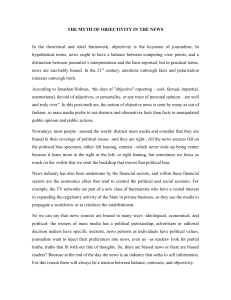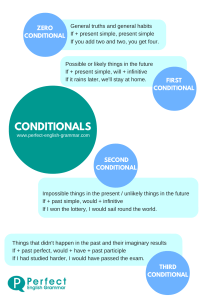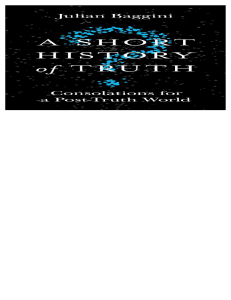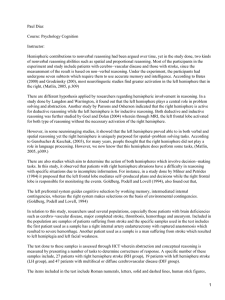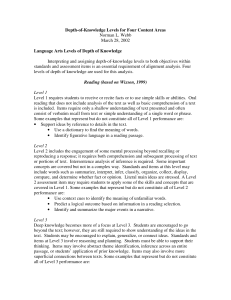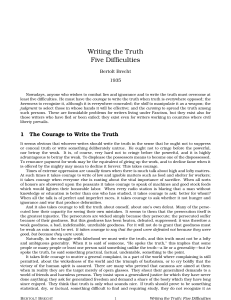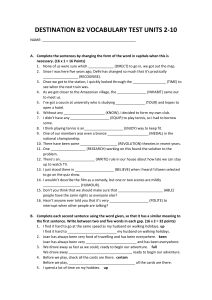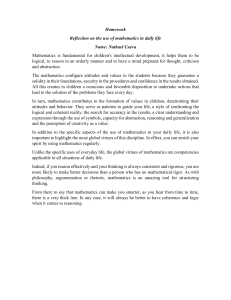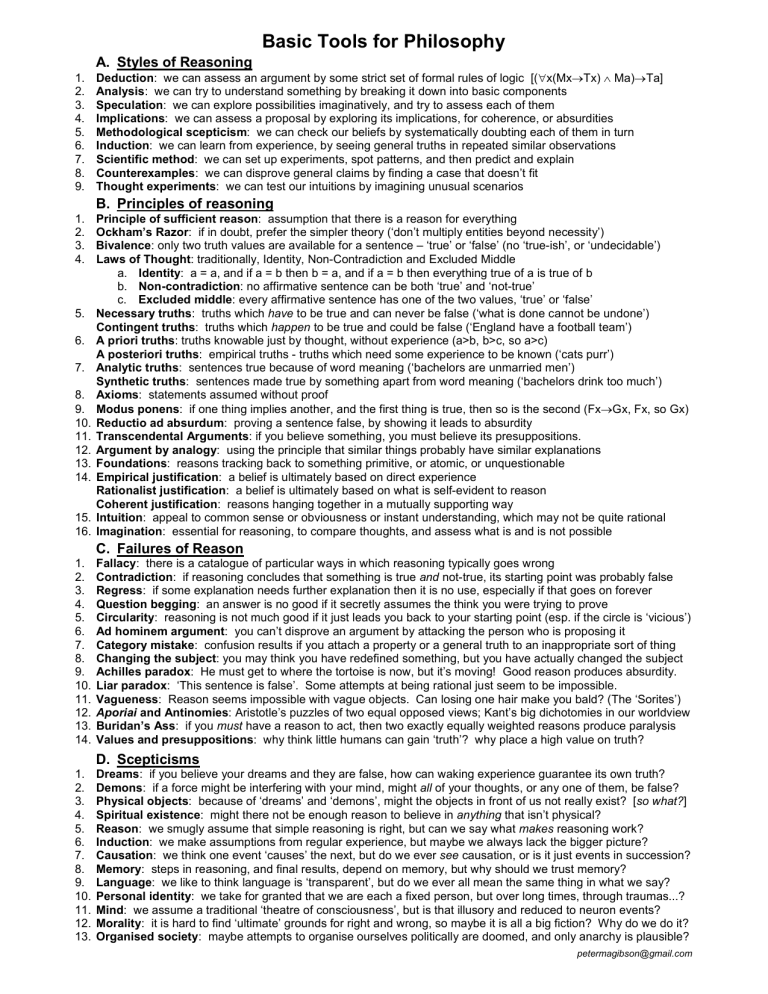
Basic Tools for Philosophy A. Styles of Reasoning 1. 2. 3. 4. 5. 6. 7. 8. 9. Deduction: we can assess an argument by some strict set of formal rules of logic [(∀x(Mx→Tx) ∧ Ma)→Ta] Analysis: we can try to understand something by breaking it down into basic components Speculation: we can explore possibilities imaginatively, and try to assess each of them Implications: we can assess a proposal by exploring its implications, for coherence, or absurdities Methodological scepticism: we can check our beliefs by systematically doubting each of them in turn Induction: we can learn from experience, by seeing general truths in repeated similar observations Scientific method: we can set up experiments, spot patterns, and then predict and explain Counterexamples: we can disprove general claims by finding a case that doesn’t fit Thought experiments: we can test our intuitions by imagining unusual scenarios B. Principles of reasoning 1. 2. 3. 4. 5. 6. 7. 8. 9. 10. 11. 12. 13. 14. 15. 16. Principle of sufficient reason: assumption that there is a reason for everything Ockham’s Razor: if in doubt, prefer the simpler theory (‘don’t multiply entities beyond necessity’) Bivalence: only two truth values are available for a sentence – ‘true’ or ‘false’ (no ‘true-ish’, or ‘undecidable’) Laws of Thought: traditionally, Identity, Non-Contradiction and Excluded Middle a. Identity: a = a, and if a = b then b = a, and if a = b then everything true of a is true of b b. Non-contradiction: no affirmative sentence can be both ‘true’ and ‘not-true’ c. Excluded middle: every affirmative sentence has one of the two values, ‘true’ or ‘false’ Necessary truths: truths which have to be true and can never be false (‘what is done cannot be undone’) Contingent truths: truths which happen to be true and could be false (‘England have a football team’) A priori truths: truths knowable just by thought, without experience (a>b, b>c, so a>c) A posteriori truths: empirical truths - truths which need some experience to be known (‘cats purr’) Analytic truths: sentences true because of word meaning (‘bachelors are unmarried men’) Synthetic truths: sentences made true by something apart from word meaning (‘bachelors drink too much’) Axioms: statements assumed without proof Modus ponens: if one thing implies another, and the first thing is true, then so is the second (Fx→Gx, Fx, so Gx) Reductio ad absurdum: proving a sentence false, by showing it leads to absurdity Transcendental Arguments: if you believe something, you must believe its presuppositions. Argument by analogy: using the principle that similar things probably have similar explanations Foundations: reasons tracking back to something primitive, or atomic, or unquestionable Empirical justification: a belief is ultimately based on direct experience Rationalist justification: a belief is ultimately based on what is self-evident to reason Coherent justification: reasons hanging together in a mutually supporting way Intuition: appeal to common sense or obviousness or instant understanding, which may not be quite rational Imagination: essential for reasoning, to compare thoughts, and assess what is and is not possible C. Failures of Reason 1. 2. 3. 4. 5. 6. 7. 8. 9. 10. 11. 12. 13. 14. Fallacy: there is a catalogue of particular ways in which reasoning typically goes wrong Contradiction: if reasoning concludes that something is true and not-true, its starting point was probably false Regress: if some explanation needs further explanation then it is no use, especially if that goes on forever Question begging: an answer is no good if it secretly assumes the think you were trying to prove Circularity: reasoning is not much good if it just leads you back to your starting point (esp. if the circle is ‘vicious’) Ad hominem argument: you can’t disprove an argument by attacking the person who is proposing it Category mistake: confusion results if you attach a property or a general truth to an inappropriate sort of thing Changing the subject: you may think you have redefined something, but you have actually changed the subject Achilles paradox: He must get to where the tortoise is now, but it’s moving! Good reason produces absurdity. Liar paradox: ‘This sentence is false’. Some attempts at being rational just seem to be impossible. Vagueness: Reason seems impossible with vague objects. Can losing one hair make you bald? (The ‘Sorites’) Aporiai and Antinomies: Aristotle’s puzzles of two equal opposed views; Kant’s big dichotomies in our worldview Buridan’s Ass: if you must have a reason to act, then two exactly equally weighted reasons produce paralysis Values and presuppositions: why think little humans can gain ‘truth’? why place a high value on truth? D. Scepticisms 1. 2. 3. 4. 5. 6. 7. 8. 9. 10. 11. 12. 13. Dreams: if you believe your dreams and they are false, how can waking experience guarantee its own truth? Demons: if a force might be interfering with your mind, might all of your thoughts, or any one of them, be false? Physical objects: because of ‘dreams’ and ‘demons’, might the objects in front of us not really exist? [so what?] Spiritual existence: might there not be enough reason to believe in anything that isn’t physical? Reason: we smugly assume that simple reasoning is right, but can we say what makes reasoning work? Induction: we make assumptions from regular experience, but maybe we always lack the bigger picture? Causation: we think one event ‘causes’ the next, but do we ever see causation, or is it just events in succession? Memory: steps in reasoning, and final results, depend on memory, but why should we trust memory? Language: we like to think language is ‘transparent’, but do we ever all mean the same thing in what we say? Personal identity: we take for granted that we are each a fixed person, but over long times, through traumas...? Mind: we assume a traditional ‘theatre of consciousness’, but is that illusory and reduced to neuron events? Morality: it is hard to find ‘ultimate’ grounds for right and wrong, so maybe it is all a big fiction? Why do we do it? Organised society: maybe attempts to organise ourselves politically are doomed, and only anarchy is plausible? petermagibson@gmail.com
